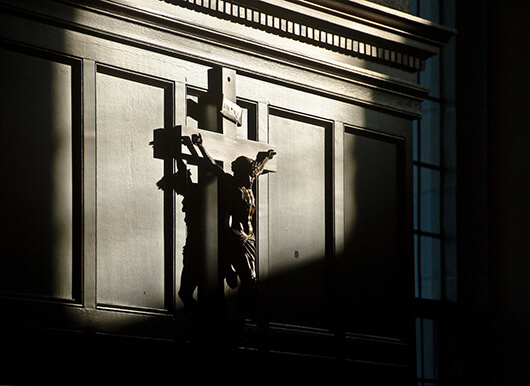Today should be different.
Such were my sentiments on a Good Friday long ago in Seattle, Washington. I was studying theology at Seattle Pacific University, a Free Methodist institution, and I was ever so gradually coming to appreciate the liturgical rhythms of the ancient church calendar.
Growing up evangelical, I had a decent appreciation of the importance of Easter observances — the dressing up, the alleluias and triumphant hymnody, the marking of that one day as a ritual zenith and a new beginning. Even the bunnies and eggs, as signs of fertility and new life, made sense to me.

Once in college, though, I couldn’t help noticing a deficit in my experience: The Easter observances I’d grown up with seemed imbalanced, incomplete without some kind of commemoration of what preceded it. If we’re going to celebrate Easter Sunday, my thinking went, shouldn’t we also mourn Good Friday, the day of Christ’s crucifixion?
My years in Seattle required Easters spent away from family — the trip home to Colorado far too long to make by car, and airfare out of my price range — so I was free to experiment, and it was during my junior year that I decided to do something different on Good Friday. There was a chapel tucked away in SPU’s Alexander Hall — stained glass, cozy, with seating for maybe a couple dozen. It was quiet and lonely, bathed in colored light: Just the place to attempt a makeshift Good Friday observance. I camped out there that day, immersed in thought and struggling to pray.
The isolation, however, was stifling. It seemed like a devotional exercise that begged for communal expression. Hence, the next year, my last in Seattle, I resolved to join with others in marking the crucifixion. I’ll bet Catholics do something that day, I thought, and I consulted a Yellow Pages to find a Catholic parish near campus. St. Margaret of Scotland, as it turned out.
I called the number and made my awkward inquiries. “Do you have any kind of services on Good Friday?” I asked. “Can anybody come?” Thinking back, I imagine the parish secretary befuddled by my call. Of course they’d have Good Friday services. Of course anybody could come. I don’t remember what she said, but I do remember getting up that Friday morning, donning Sunday-only attire and heading out on foot. I think I even wore a tie.
‘What is happening? Today there is a great silence over the earth . . . a great silence because the King sleeps,’ goes an ancient Holy Saturday homily.
Skirting the base of the city’s historic Queen Anne Hill, I arrived on time for the midday liturgy. Filing into the tiny church with the other worshippers, I took a seat near the back — on the aisle for a better view. It was hushed and still. A bulletin rustle here, a baby whimper there. The mood was close and expectant; a whiff of Holy Thursday incense hung in the air from the night before. I had no idea what lay ahead.
Then the priest came out, all robes and redness, flanked by servers, a processional cross at the fore. There were prostrations and prayers, Scriptures and songs, and kneeling, lots of kneeling, and standing and kneeling again. And it was sad, so sad — and solemn. I was fascinated and disturbed by it all. Yet it all seemed so fitting, so “meet” as the English used to say. Sobriety, like kneeling, was profoundly appropriate in light of Calvary. So was weeping, and I know I wept that day, particularly when we went up to venerate the cross. There, right there, was my crucified Lord — an image at that point still utterly foreign to me. I crouched and kissed it, following the lead of the people in front of me. Chastened, I returned to my seat.
“What is happening? Today there is a great silence over the earth, a great silence, and stillness, a great silence because the King sleeps,” goes an ancient Holy Saturday homily. “God has died in the flesh, and the underworld has trembled.” These words capture well the emotion that swamped me at St. Margaret’s that afternoon and lingered long after I trudged back to my dorm. They remained with me even before I gravitated to Catholicism later in life, and they swell up again every year on the Friday before Easter.
Over time, I’ve come to see that I was far from alone in yearning for Good Friday. Many Christian communities and traditions come together on that day to grieve our collective and violent rejection of the Savior. Many people, even those of tentative church affiliation, solemnize that awful day with somber celebrations.
I’m sure this was true in Seattle back when I was a student there, but I simply didn’t know. Good Friday observances are as ecumenical and popular as the Ash Wednesday services that inaugurate Lent. Both offer a rare public catharsis for the tensions inherent in being human and fallible. It’s good for us to look backward at personal reforms derailed and progress thwarted; it’s good to honestly embrace our shortcomings and guilt.
At the very least, such honest, backward glances make us all the more jubilant on Easter as we look ahead to possibility, promise and hope.
Rick Becker is a Notre Dame parent, writer and registered nurse who teaches nursing at Bethel College in Mishawaka, Indiana.